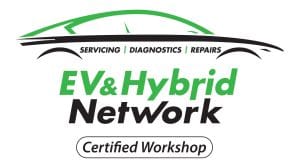As more Australians make the shift to electric vehicles, one of the most important yet misunderstood aspects of EV ownership is the battery warranty. While many new EV owners are familiar with warranties for petrol engines or drivetrains, the high-voltage battery that powers an EV is a different beast altogether—and replacing one can cost tens of thousands of dollars if it’s not covered.
Knowing what’s included in your EV battery warranty, and what isn’t, can help you avoid unnecessary costs and ensure your vehicle is maintained correctly. It also highlights the value of choosing a specialist workshop, like those in the EV & Hybrid Network, to support any battery-related concerns or warranty claims.
What an EV Battery Warranty Typically Covers
In most cases, the EV battery warranty provided by manufacturers guarantees that the battery will retain a certain percentage of its original capacity over a specified period. In Australia, the standard warranty period for high-voltage EV batteries is between 8 to 10 years or a certain kilometre limit—whichever comes first. Commonly, this threshold is set at 70% capacity retention.
This means that if your battery degrades significantly—dropping below 70% of its original usable capacity within the warranty period—it may be eligible for repair or replacement under warranty. It’s important to note that this does not refer to your range decreasing slightly due to normal wear, but rather a measurable and confirmed capacity loss that exceeds the manufacturer’s threshold.
Exclusions and Limitations You Need to Know
While the coverage sounds reassuring, there are conditions and exclusions that vehicle owners should be aware of. Warranties may not apply if the battery has degraded due to misuse, improper charging habits, unauthorised modifications, or exposure to extreme environmental conditions.
For instance, consistently using DC fast chargers in extreme heat, or regularly running the battery to 0%, could accelerate degradation in a way that’s deemed avoidable by the manufacturer. Similarly, third-party repairs, software tampering, or even undocumented battery resets (which some workshops or sellers may attempt to hide degradation) can void your warranty.
It’s also worth understanding that battery warranties do not usually cover natural range loss over time due to regular use. A 10–15% reduction in range over several years is considered normal and not eligible for warranty action unless it drops below the official capacity retention threshold.
How to Prove Battery Degradation for a Claim
In the event that you believe your EV’s battery is underperforming, it’s crucial to have a professional assessment done. This is where EV & Hybrid Network workshops provide significant value. These workshops are equipped with the tools and expertise to carry out State of Health (SOH) testing and interpret the results accurately. They understand the manufacturer-specific protocols and can provide documentation that supports a valid warranty claim.
While many manufacturers rely on data from the vehicle’s Battery Management System (BMS), some may also accept results from independent SOH tests—especially when performed by trained technicians using approved diagnostic methods. This is particularly important for EV owners outside major metro areas where dealer access may be limited.
Why Choosing the Right Workshop Matters
Navigating a warranty claim can be tricky without the right support. EV & Hybrid Network member workshops stay up to date with battery degradation patterns, warranty requirements, and manufacturer expectations. They can identify whether your battery’s performance loss is within expected parameters or if it may qualify for a claim.
Furthermore, these specialist workshops know how to avoid warranty-voiding pitfalls. They follow correct high-voltage service protocols, use approved equipment, and understand which battery issues are repairable versus those that require replacement.
For owners of imported EVs or older second-hand models, a knowledgeable workshop can also help interpret warranty coverage from overseas manufacturers or aftermarket suppliers—something many general workshops are not equipped to handle.
Final Thoughts
Battery warranties are a critical safeguard for EV owners, but they come with conditions that need to be properly understood and managed. A drop in performance doesn’t always mean your battery is failing, but if it is, you want to be sure your claim is backed by data and assessed by professionals who specialise in EV systems.
Visiting an EV & Hybrid Network member workshop ensures you receive expert advice, thorough diagnostics, and support when it comes to making a warranty claim. With battery technology being the most expensive part of your electric vehicle, it’s worth taking the right steps to protect your investment and maintain your peace of mind.
If you’re experiencing range loss or suspect your battery is underperforming, book a health check at your nearest EV & Hybrid Network workshop. Let a trained specialist give you the clarity and confidence you need to keep driving forward.
2025 EV Manufacturer warranty periods:
| Manufacturer | Vehicle Warranty | Traction Battery Warranty |
| Fiat | 3 years / unlimited km | 8 years / 150,000 km |
| Porsche | 3 years / unlimited km | 8 years / 160,000 km |
| Tesla | 4 years / 80,000 km | 8 years / 160,000–192,000 km |
| Renault | 5 years / 100,000 km | 8 years / 160,000 km |
| LDV | 5 years / 160,000 km | 8 years / 160,000 km |
| Ford | 5 years / unlimited km | 8 years / 160,000 km |
| Genesis | 5 years / unlimited km | 8 years / 160,000 km |
| Hyundai | 5 years / unlimited km | 8 years / 160,000 km |
| Jaguar | 5 years / unlimited km | 8 years / 160,000 km |
| Lexus Toyota | 5 years / unlimited km | 10 years / unlimited km (with annual health checks) |
| Mini | 5 years / unlimited km | 8 years / 100,000 km |
| Nissan | 5 years / unlimited km (standard) / 10 years / 300,000 km (with dealer servicing) | 8 years / 160,000 km |
| Polestar | 5 years / unlimited km | 8 years / 160,000 km |
| Audi | 5 years / unlimited km | 8 years / 160,000 km |
| BMW | 5 years / unlimited km | 8 years / 160,000 km |
| Cupra | 5 years / unlimited km | 8 years / 160,000 km |
| Volvo | 5 years / unlimited km | 8 years / 150,000 km |
| BYD | 6 years / 150,000 km | 8 years / 160,000 km |
| GWM (Ora) | 7 years / unlimited km | 8 years / unlimited km |
| Kia | 7 years / unlimited km | 7 years / 150,000 km |
| MG | 10 years / 250,000 km | 10 years / 250,000 km |

Find EV & Hybrid Workshops in Australia.

